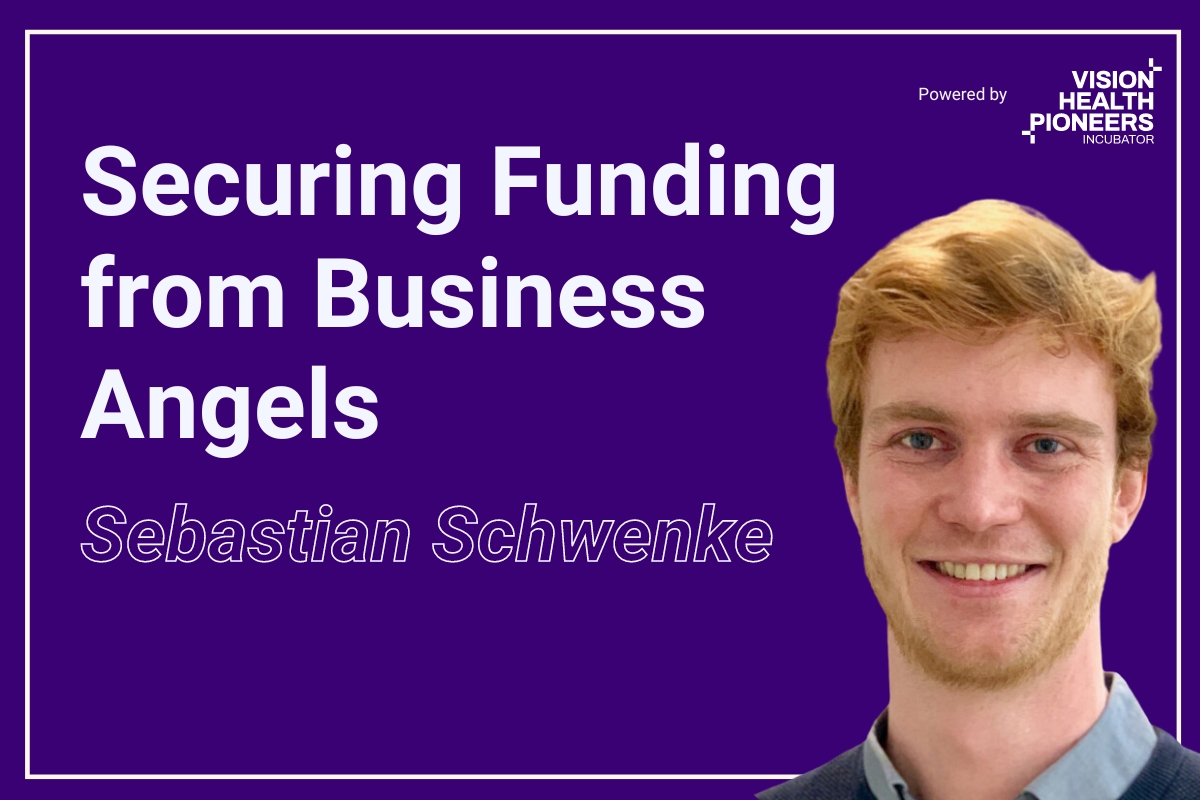
09 May Find the business angel that believes in you — Advice on Raising Capital from Business Angels
Before fundraising from VCs, early-stage startups often go down the path of angel investing. But when does pursuing this path make sense, and what do HealthTech founders need to know when raising capital from angels? We spoke with Sebastian Schwenke, Managing Director of our partner Business Angels Club Berlin Brandenburg (BACB) to find answers.
Could you give a short overview of BACB?
BACB (Business Angels Club Berlin Brandenburg) is with 130 members the largest angel network in the region. We are an open network and welcome everyone interested in becoming a business angel.
We are also very open to talking to first-time founders who are in the scholarship programs here in Berlin, like EXIST or the Berlin Startup Scholarship. We aren’t an elite, closed organization. We want to remain accessible because we believe that financial support, especially for early-stage startups, is something we have to solve together as a society. That said, we work to ensure that our members have deep industry knowledge and the necessary funds to actually support startups.
In the past years, our members have invested between three and four million euros in 20 to 30 rounds each year in startups from our deal flow. Usually, two-thirds are initial investments, and one-third is dedicated to follow-on rounds into the portfolio of our members.
The association itself doesn’t invest in startups, but matches business angels with the startups and then streamlines the whole investment process. This also means that we try to have calls with all interested angels together so startups don’t have to talk to each individual and negotiate with each investor individually.
In the end, our angels invest directly into the startups and to the cap table. We have quite a lot of syndication with on average three to five angels investing, on average €150,000 per investment case.
When does it make sense for founders to raise money from angels?
“It is never too early to connect to angels and tell them a little bit about what you are doing or what you want to do, or just try to understand their perspective on different topics. It will help you in developing the right product or the right business.
That said, startups often raise their 50,000-150,000 Euro round from friends and family. While there might be business angels involved, at such an early stage, the risks are often too high for them. That’s why startups try to find 1 to 3 people who invest small tickets to secure runway for another 6 to 12 months. At this time, when you are able to show the necessary first traction, you need to raise your first actual angel round.
To get significant angel funding, say rounds of 300,000 to 750,000 Euro, you need some market validation. This means you either have revenue or beta testers or completed your first small studies — not the full clinical trials, but some proof that people actually want to buy the product you are building. It could also be letters of intent from large hospitals or other key buyers or active pilot projects. You need to be able to show that people would want to work with you and eventually pay for what you’re doing.”
What are To-Dos for HealthTech founders seeking to raise money from angels?
- Understand your valuation. You shouldn’t give away more than 20 percent in your first round. Many founders with no traction and unfinished prototypes claim they need to raise at a $5 million pre-money valuation to avoid excessive dilution. However, when we work through the cap table together, we often find this assumption is based on a misunderstood rule of thumb. Be open and transparent about your cap table when talking to angels. If you’re unsure how to set a valuation, admit it. Good angels, especially in the early stage, will help you rather than exploit you, as they understand that an unrealistic valuation can jeopardize your company’s future funding prospects.
- Follow up and don’t think the first rejection is a rejection forever. When we decline an application because there’s no interest from our angels, we always tell the teams to apply again in 3 or 6 months. However, almost none of the teams actually apply again even though they are still fundraising. Many angels have regular jobs and are not all active at the same time. You have to be persistent and not give up too early, understanding that a no is only a “no” at this point in time and not forever. The same goes for VCs.
- Know how to explain your product in a way that even your grandma would understand. Especially in the healthtech segment, I see a lot of brilliant minds who have a really hard time getting the information across to people who are not from the industry. Learn how to address not only the people from your specific industry but also a broad range of investors. This is crucial, because a cap table usually consists of only 1-2 angels with healthcare market expertise, and the majority will invest simply because they like the topic. However, for them to like the topic and for you to bring your value across, you need to be able to explain what you are doing in a language they understand.”
What are four recent investments in HealthTech your members have made?
Last year, 28 percent of the total capital was invested in healthcare startups. We have a dedicated cluster called the BACB health angels, which is a group of investors with expertise in healthcare that only targets startups in this industry. Every applying healthcare startup will be screened and selected by and receive feedback from those experts.
Our investments in healthcare range from digital health to pharmaceuticals. Some of the top companies include:
- Aumio, a sleep and meditation app for children and families
- Nia Health, a medical product, covers a wide variety of use cases in dermatology and allergology, such as eczema and neurodermatitis.
- BearCover builds robots that act as a nightshift worker in elderly care facilities and clinics. It screens the patient’s rooms without having to enter the room and alerts the staff if, for example, people are not in their room or if they’ve fallen out of bed.
- Nephrolyx offers a precise and rapid measurement of kidney function via testing kits for hospitals. They address the issue of patients being discharged from the hospital only to experience acute kidney failure shortly afterward.
What emerging trends do you see within your angel network and in HealthTech?
In our network, we have seen an increased appetite for hardware products, like testing kits and telemedicine solutions. We also see a move towards integrating existing certified products into an ecosystem. This enables home testing, remote monitoring, telemedicine, and similar services. Our angels are increasingly drawn to the potential of software and hardware combinations, which are now more relevant and appealing than they were two or three years ago.
Zooming out, the healthcare market is shifting from treating diseases towards preventive care, prioritizing data-driven interventions to support individuals before they get sick. In predictive maintenance and big data analytics, there is still so much opportunity.
Talking about opportunities, I believe there’s immense potential in scientific research coming out of universities to evolve into successful business models. However, many professors struggle to find partners willing to develop their intellectual property into companies. As a founder, rather than trying to come up with your own ideas, I recommend talking to professors and exploring the scientific innovations that could be commercialized.”
What are the primary obstacles for HealthTech startups in securing funding in 2024?
Over the past year and a half, fundraising has become more challenging overall. However, well-prepared startups with strong intellectual property still manage to secure significant funding. While investment may not be as widespread, exceptional teams often receive higher amounts of funding. Many VCs now advise startups to seek funding for longer periods, typically 24 months or more, due to extended fundraising timelines. Also, cases that can hit break-even after initial investment rounds are much more attractive than those that need significant follow-on funding. In healthcare, this gets more tricky because of lengthy regulatory processes.
Despite the tougher climate, promising teams with expertise and innovative products still attract investment. Focus on the internal values and strengths of your startup. Currently, this is what resonates with investors more than inflated storylines or acquisition potential.
How can founders best reach you?
Founders can reach me via LinkedIn. They can also email dealflow@bacb.de with questions about the application process or get a very quick thumbs up or thumbs down. However, in general, the best way is to apply via our website so we have all the information we need to assess the company. If founders apply through the form on our website, they also get access to our dealflow platform Dealum which they can use to reapply without having to fill everything out again from scratch.
A warm thank you to Sebastian Schwenke for this interview. Want to connect with Business Angels Club Berlin Brandenburg? We have listed a couple of options for you below:
- Follow BACB on LinkedIn to get notified about events, e.g. Healthcare Innovators Bridge Berlin on 26.09.2024
- Join the Summer Network Meetup and 20-anniversary birthday party on 12.07.2024.



